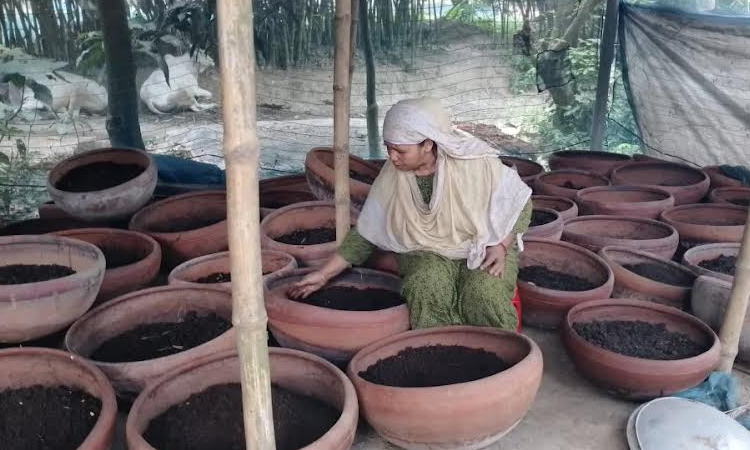News Flash
News Flash

By Md Aynal Haque
RAJSHAHI, April 5, 2025 (BSS)- Many people in the region, particularly in the Barind tract, are gradually improving their living and livelihood conditions by engaging in the production and marketing of vermicompost, an organic fertilizer whose demand is rising for crop and vegetable cultivation over the past few years.
Basically, the venture is contributing a lot towards lessening the gradually mounting pressure on chemical fertilizer in the region, including its vast Barind tract.
Karigorpara village under Paba upazila in the district has already been declared as a 100 percent vermicompost-producing and using village. No chemical fertilizers will be used in the village's farmlands anymore, as all farmers have switched to vermicompost produced locally.
Talking to BSS on Thursday, Jabbar Ali, a farmer of the village, said he has been involved in the production and marketing of vermicompost since 2017. He earns an average of Taka 12,000 per month by selling the organic fertilizer.
Other farmers of the village, including Momena Begum, Sultan Ahmed, and Amrita Sarker, also shared their success stories with vermicompost production.
Beyond Karigorpara, the vermicomposting trend has expanded to other villages, with many farmers showing interest in establishing vermicompost farms due to the high returns and sustainability.
In Karibona village under Durgapur upazila, vermicomposting has emerged as a popular and profitable farming practice, significantly enhancing soil fertility.
Jahangir Alam, 35, of Shinghamara village under Mohanpur upazila, has become almost self-reliant by producing vermicompost at a household factory set up with the help of his wife, Sahar Banu. The couple has also taken on the role of educators, teaching others in their village how to produce vermicompost and become self-reliant.
They plan to train 10 women in each village under their upazila free of cost and assist them in establishing their own vermicompost farms. The couple has appealed to the government for financial assistance to expand their initiative, aiming to produce 400 maunds of vermicompost daily.
In Mohishkundi village of the same upazila, the lives of Shah Alam and his wife Momtaz have also changed for the better due to vermicomposting, overcoming years of poverty and uncertainty.
Meanwhile, Raihan Kabir of Kharibona village under Nachole upazila has set an inspiring example by starting his vermicompost venture with 2,000 earthworms in five earthen pots in 2017. He has sold 2,100 kilograms of vermicompost worth around Taka 27,300 and currently has 600 kilograms in stock. Over the past year, he has expanded his operation to 63 pots.
Muhammad Ali, a farmer of Gulalpara village under the same upazila, said vermicompost has proven particularly beneficial for betel leaf farming, helping to prevent diseases. "I have been using organic fertilizer instead of chemical fertilizers for the last five to six years," he said, adding that many of his fellow farmers are now adopting similar practices.
Umme Salma, Deputy Director of the Department of Agricultural Extension (DAE), said vermicomposting has brought a remarkable change in agriculture. She noted that Baragachi Union in Paba upazila, known as the heart of vegetable farming, has embraced the use of vermicompost after learning about its benefits through government and NGO initiatives.
Dr Azizur Rahman, Additional Director of the DAE, stated that vermicompost fertiliser is being used to regain the fertility of land which was drastically lost due to excessive use of chemical fertiliser.
Many farmers have started manufacturing this organic fertilizer after taking training from the DAE.
"We have adopted special programmes of creating awareness among the farmers about vermicompost so that the lands get back productive capacity lost for excessive use of chemical fertilizer," he added.